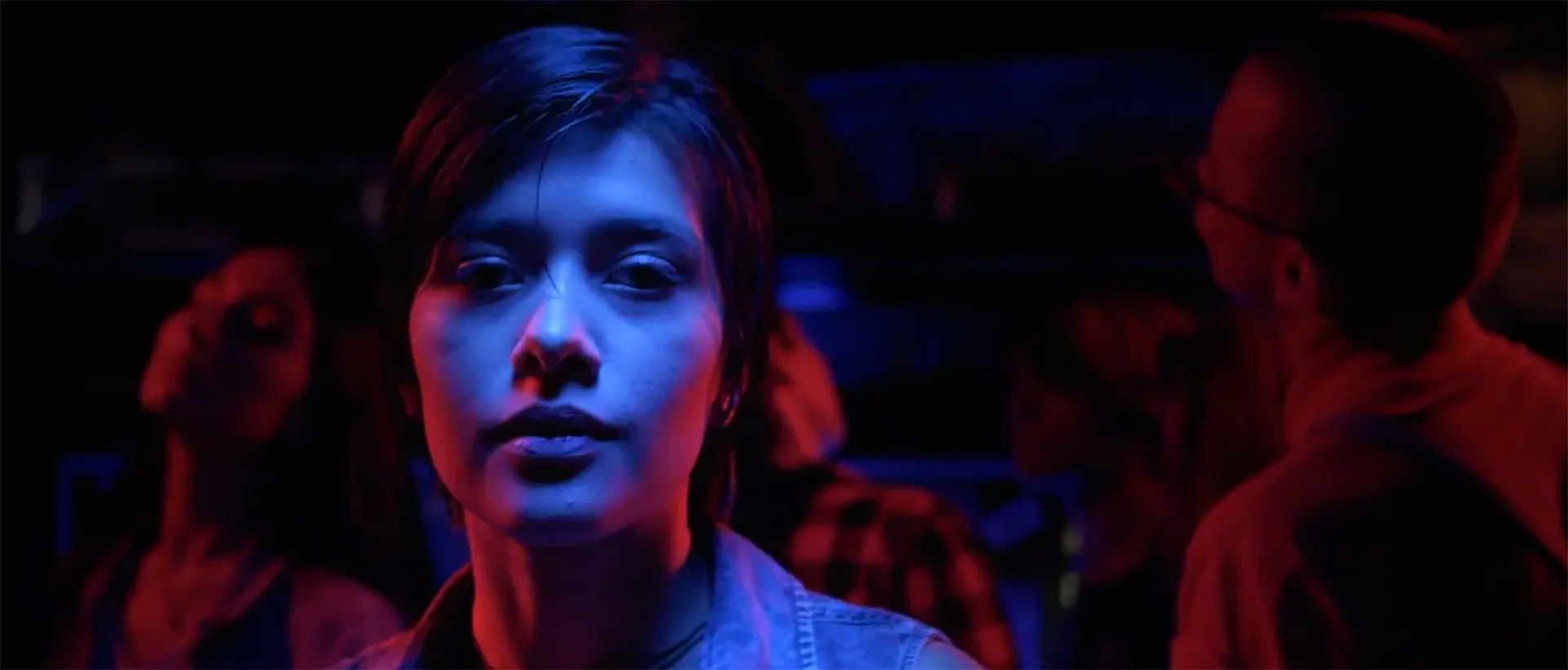Everyone collided one fateful day in 1993. Beatriz (Liseth Delgado) and Lizeth (Karen Osorio) left school and cheered up sad little Mateo (Sebastián Carreño) before a speeding car passed and crashed a few feet away. Engulfed in flames, the driver (Carlos Fernando Pérez) screamed as he fought to escape the wreckage. The teens ran to the burning man to suppress the fire with their jackets, saving him until an ambulance could arrive. It was a harrowing moment captured on a roll of film inside Beatriz’s camera—one shot even immortalizing the victim’s daughter Florencia as the two of them rode away. Why Beatriz (played as an adult by co-writer Carolina Mosquera) suddenly remembers that day twenty years later is yet unknown, but she cannot shake it.
Is it because Lizeth (Nathalia Franco Rodríguez as an adult) is visiting soon? Did Beatriz just discover Mateo’s fate even though we won’t until the very end of the film? Maybe it’s something deeper like a sinking suspicion of who Cota is (regardless of literally having no idea) ignited by the misogyny she endures at work as an engineer with male subordinates? Co-writer and director Alfonso Acosta doesn’t seem to be worried about it, so we decide we won’t worry either as Rage progresses through its confusing time shifts and incomplete context (a combination of intentionally holding information back, cropping certain frames to mask what we obviously see is supposed to be important to a reaction, and introducing characters with unearned familiarity). We’ll hope the ride is enough.
Some will probably say it is, since the film is undeniably stylish with great production value, attractive cinematography, and an effective score. Add solid acting with a very good central performance by Mosquera and there’s little to dislike on the level of craft, besides the narrative that has brought them all together. It’s not even that the plot is bad. The notion of Beatriz discovering the man she saved may have harmed a lot of people in the years that followed is a captivating premise with which to send her on a mission to make things right. Our journey to figuring out that’s what’s happening is so convoluted, however, that things don’t galvanize until we’ve already questioned ourselves about why we haven’t left the theater.
The reason is simple: Beatriz doesn’t know that’s why she can’t let this go. Half the film is predicated on curiosity alone without ever really learning who she is to continue pushing forward once her investigation bears complicated, violent fruit. First, it’s a grown-up Florencia (Katheryn Guzmán Flor) lying about Cota being dead and telling her to leave her alone before a quick about-face sees her suddenly interested in discovering where her father is now too. Then it’s the shady Rogelio (Camilo Jimenez Varon) telling Beatriz he knows where he is before threatening her with harm. Add a young thief (Camila Jurado’s Magdalena), a lovelorn friend (Luis Fernando Velasco’s Pablo), and random glimpses into the past for clarity and it becomes way too much.
I can only describe it as a season worth of material compressed into a 100-minute package that leaves out the details we need to stand by Beatriz’s side. We learn nothing about the twenty years that have passed beyond tiny bits like her engineering job (which she quits as soon as we find out) or her grandmother’s floral business (which we only see her working as a teen once before giving it away as an adult). Acosta and Mosquera seem to believe that knowing Beatriz is a “good” person is enough to ignore the ocean of what we don’t. While it is for the last thirty minutes of her character having intent, it’s not for the first seventy. It’s just happenstance until then—the confounding kind, not mysterious.
Thankfully the destination proves worthwhile regardless. The payoff can’t single-handedly erase the script issues that came before it, but finding purpose in the eleventh hour did at least stop me from thinking I had wasted my time. Conveniences still abound (Beatriz very carefully refuses drinks from strange men with what appears to be a healthy dose of mistrust before taking up the worst person she could on his offer later), but you can look beyond them to enjoy the result. Some parts might have made more sense too if Acosta didn’t feel the need to always chop sequences up to reveal what’s missing in the future, but I can’t deny how doing so positively affected the pacing and propulsion of the whole. Aesthetics are always trumping coherence.
Your overall enjoyment is thus reliant upon those aesthetics holding your attention. I found the characters too intriguing to not want to know more, and not learning much kept me at too far a distance to engage with what was occurring. I merely consumed it instead. With no room to anticipate or emotionally invest, I became a bystander processing every new revelation as though entries on a checklist—forgetting them as we moved to the next. Do some of them connect? Sure. At a certain point, however, figuring out how did become a waste a time. Because, in the end, the only thing that matters is whether Beatriz stops the man she unwittingly unleashed. The rest is just noise.
Rage is playing at the Buffalo International Film Festival.

